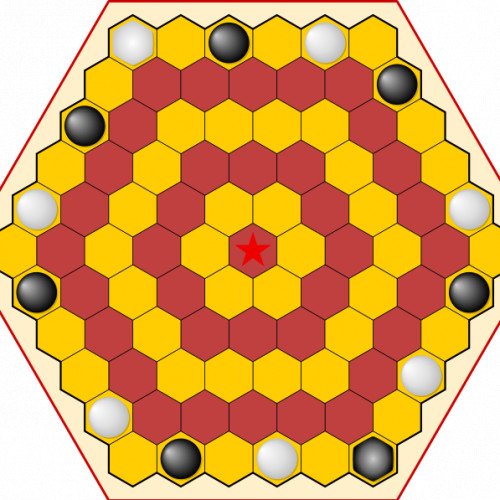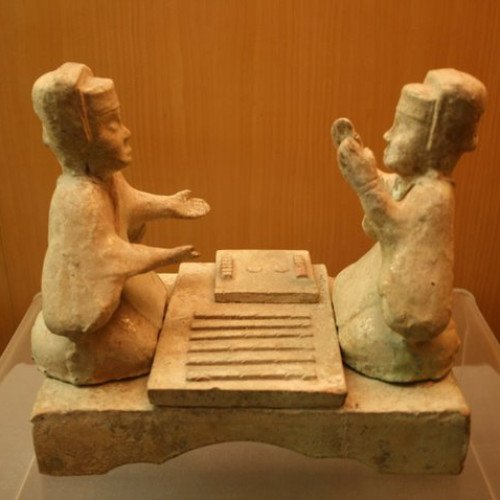AGON VS LIUBO

AGON
Agon (or Queen's Guards or Royal Guards) is an strategy game invented by Anthony Peacock of London, and first published in 1842. It is a two player game played on a 6×6×6 hexagonal gameboard, and is notable for being the oldest known board game played on a board of hexagonal cells. Each player has one queen and six guards. Players determine who moves first, then turns alternate. On each turn, a player moves one of his pieces. The object of the game is to be first to maneuver one's queen to the central hex (the throne) at the center of the board, and surround her with all six of her guards. The gameboard may be thought of as a series of concentric rings of hex cells (highlighted by rings of alternating colors). Pieces move one step at a time to an adjacent cell, either sideways in the same ring, or towards the throne to the next ring. The cell moved to must be vacant. Only the queen may move to the throne.
Statistics for this Xoptio

LIUBO
Liubo (Chinese: 六博 or 陸博; pinyin: liù bó; Wade–Giles: liu po; lit. 'six sticks') is an ancient Chinese board game played by two players. For the rules, it is believed that each player had six game pieces that were moved around the points of a square game board that had a distinctive, symmetrical pattern. Moves were determined by the throw of six sticks, which performed the same function as dice in other race games. The game was invented no later than the middle of the 1st millennium BCE, and was popular during the Han dynasty (202 BCE – 220 CE). However, after the Han Dynasty it rapidly declined in popularity, possibly due to the rise in popularity of the game of Go, and it became totally forgotten. Knowledge of the game has increased in recent years with archeological discoveries of Liubo game boards and game equipment in ancient tombs, as well as discoveries of Han dynasty picture stones and picture bricks depicting Liubo players. It is not known when the game of Liubo originated, although according to legend it was invented by Wu Cao (烏曹, called Wu Zhou 烏胄 in the early 2nd century CE Shuowen Jiezi dictionary), a minister to King Jie, the last king of the Xia dynasty, who according to traditional chronology reigned 1728–1675 BCE. While there is no archeological or reliable documentary evidence to support the view that Liubo dates back to the Shang dynasty (1600–1046 BCE), early Chinese records do indicate that Liubo was already a popular game by the Warring States period (476–221 BCE). For example, the Records of the Grand Historian records a speech made during the reign of King Xuan of Qi (reigned 319–301 BCE) that claims that the capital city of Linzi was so wealthy that its citizens were all able to indulge in activities such as playing musical instruments, cockfighting, dog racing, playing Liubo and playing kick ball.